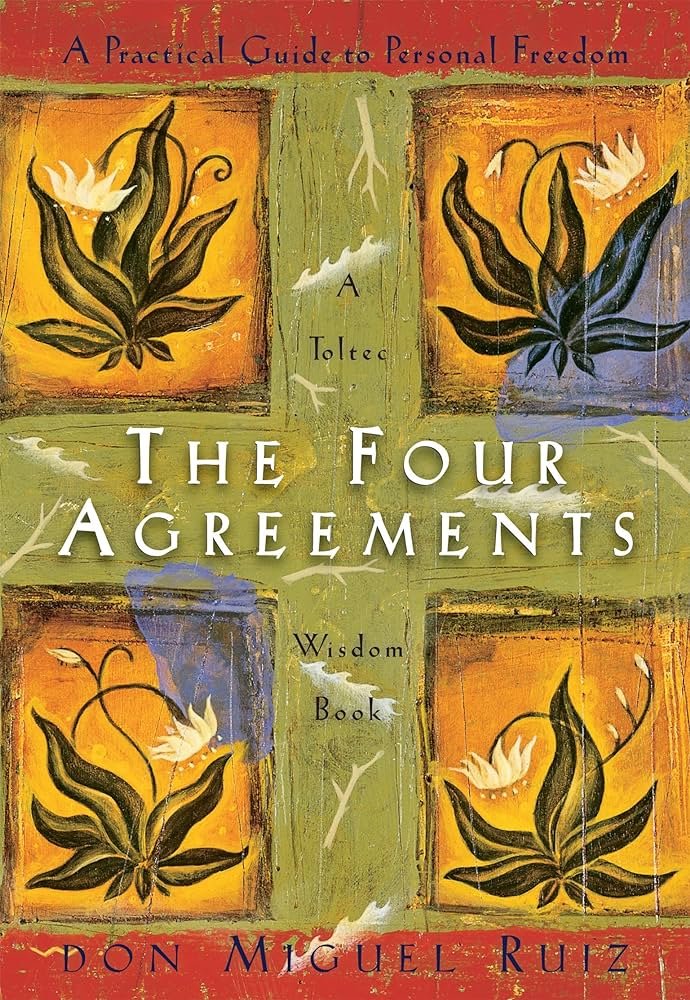
August 12, 2024
Coach G
No Comments
The Four Agreements by Don Miguel Ruiz is a spiritual classic that offers readers a simple yet profound framework for personal growth and self-transformation. Rooted in ancient Toltec wisdom, the book challenges readers to adopt four core principles, or “agreements,” that can lead to a life of freedom, happiness, and love. In this in-depth exploration, we’ll dive deep into each of the agreements, examining their significance, practical application, and the impact they can have on our lives.
1. Be Impeccable with Your Word
Understanding the Agreement:
The first agreement is about the immense power of the word. Ruiz asserts that words are not just symbols or sounds, they are the most powerful tool we possess as humans. They can create beauty, harmony, and love, or they can destroy, hurt, and enslave. To be impeccable with your word means to speak with integrity and honesty, and to use language that promotes love and truth rather than harm.
Breaking It Down:
- Power of Language: Our words can plant seeds in the minds of others, influencing their thoughts, feelings, and actions. This is why it’s crucial to be mindful of what we say and how we say it.
- Self-Reflection: This agreement also extends to how we talk to ourselves. Negative self-talk can be just as damaging as the harmful words we direct toward others. Practicing self-compassion and affirmations can help reprogram our inner dialogue.
- Avoiding Gossip: Ruiz emphasizes that gossip is one of the most destructive uses of the word. It spreads negativity and perpetuates harm, both to others and to ourselves. By avoiding gossip, we maintain the purity and power of our words.
Practical Application: To apply this agreement, begin by consciously monitoring your speech. Notice when you’re about to say something negative or unkind and choose instead to speak words that are constructive and uplifting. When you make a mistake or hurt someone with your words, own up to it and apologize. Over time, this practice will help you cultivate a habit of impeccable communication.
2. Don’t Take Anything Personally
Understanding the Agreement:
The second agreement is about understanding that the actions and opinions of others are not about you; they are reflections of their own reality. Ruiz explains that when we take things personally, we are assuming that everything revolves around us, which is not the case. By not taking things personally, we free ourselves from unnecessary suffering and the emotional baggage of others.
Breaking It Down:
- Emotional Immunity: Ruiz describes this agreement as a kind of emotional immunity. When we stop taking things personally, we become less vulnerable to the opinions and actions of others, and we can maintain our inner peace.
- Self-Worth: A key aspect of not taking things personally is understanding and accepting your self-worth. When you are secure in who you are, the judgments and criticisms of others lose their power over you.
- Projection: Often, when someone says something hurtful or negative, they are projecting their own issues, fears, or insecurities onto you. Recognizing this helps you detach emotionally and respond with empathy or indifference, rather than hurt.
Practical Application: The next time someone says or does something that could be perceived as hurtful, pause and remind yourself that it is a reflection of their inner world, not yours. Practice responding with curiosity or compassion, rather than defensiveness. Over time, this practice will build your emotional resilience and reduce the impact of external negativity on your well-being.
3. Don’t Make Assumptions
Understanding the Agreement:
The third agreement encourages clear communication and the courage to ask questions rather than make assumptions. Assumptions can lead to misunderstandings, hurt feelings, and unnecessary conflict. Ruiz highlights that most of our suffering comes from making assumptions and taking them as truth without verifying the facts.
Breaking It Down:
- Clarity in Communication: This agreement underscores the importance of clear, direct communication. When we assume we know what others are thinking or feeling, we often create false narratives that can lead to conflict.
- Courage to Ask Questions: Asking questions requires vulnerability and courage, as it may reveal uncomfortable truths or challenge our own perceptions. However, it is a crucial step in avoiding misunderstandings and fostering deeper, more authentic connections.
- Avoiding Misinterpretations: Misinterpretations often occur because we project our own fears, insecurities, or past experiences onto others. By seeking clarification, we can avoid these pitfalls and maintain healthier relationships.
Practical Application: Whenever you find yourself making assumptions, whether about someone’s intentions, feelings, or actions, pause and ask yourself, “Is this really true?” Practice the habit of asking questions, even if they feel uncomfortable. Clarify intentions, express your needs, and encourage others to do the same. This approach will lead to more honest and fulfilling interactions.
4. Always Do Your Best
Understanding the Agreement:
The fourth agreement is about effort and consistency. Ruiz emphasizes that your “best” will vary from moment to moment, depending on your circumstances, health, and energy levels. The key is to consistently strive to do your best, whatever that may look like at any given time. This agreement ties the other three together, as it encourages you to apply them to the best of your ability, without judgment or regret.
Breaking It Down:
- Self-Acceptance: Doing your best is not about perfection; it’s about acceptance. Understand that your best today might not be the same as your best yesterday or tomorrow, and that’s okay. What matters is the effort, not the outcome.
- Effort and Consistency: This agreement highlights the importance of showing up consistently in all areas of life. Whether you’re working on a project, maintaining a relationship, or practicing self-care, doing your best means giving your full attention and energy to the task at hand.
- Avoiding Regret: When you do your best, you minimize feelings of regret, guilt, or shame. You can look back on your actions with peace, knowing that you gave it your all, regardless of the outcome.
Practical Application: Approach each day with the intention of doing your best in all that you do. Whether it’s your job, your relationships, or your personal growth, strive to put in genuine effort. At the end of the day, reflect on your actions without judgment. If you feel you could have done better, acknowledge it and resolve to try again tomorrow. This practice will cultivate a sense of fulfillment and purpose in your life.
Living the Four Agreements
The Four Agreements offers a path to personal freedom by encouraging us to break free from self-limiting beliefs and behaviors. By being impeccable with our word, not taking things personally, avoiding assumptions, and always doing our best, we can transform our relationships, our self-perception, and our overall quality of life. These agreements are not just rules to follow but principles to embody in every aspect of our lives.
Living these agreements takes practice and dedication, but the rewards are immense: a life filled with peace, love, and true personal freedom. As you integrate these principles into your daily life, you’ll find that they become second nature, leading you to a deeper understanding of yourself and the world around you.
The Four Agreements invites you to step into a new reality, one where you are empowered to create the life you desire, free from the chains of fear, judgment, and self-doubt. It’s a journey worth embarking on, and the transformation begins with a single step: adopting the agreements as your own.
Whether you’re new to The Four Agreements or revisiting its wisdom, the lessons it offers are timeless and universal. Apply these teachings daily, and watch as your life begins to align with the truth, love, and freedom that Don Miguel Ruiz so beautifully articulates. I absolutely recommend having this book in your Library and revisit the concepts regularly until you truly apply them.
Let’s Keep the Growth Going
You’ve come this far for a reason. Stay connected and receive insights that meet you where you are—right in your inbox.
- Join our Newsletter -
Share:
Categories
Popular Posts
Don’t Fall in Love. Rise in Love.
January 22, 2026
Tags
Book Summary
Coach G
Coaching
consciousness
ego
Emotional Healing
Emotional Intelligence
Emotional Resilience
empowerment
faith
forgiveness
Growth Mindset
healing
Inner Peace
law of attraction
letting go
life coach
life coach Dubai
Life Coaching
Life Coaching Dubai
Manifestation
marriage
Mental Health
Mindfulness
Mindset Shift
oneness
Personal Development
personal growth
Personal Transformation
Positive Mindset
productivity
quantum psychology
relationships
Resilience
Self-Awareness
Self-Discovery
Self-Improvement
Spiritual Awakening
spiritual coach
spiritual growth
spirituality
Success Mindset
Time Management
Transformation
Universal Laws
Useful Links
Quick Menu
Contact Us
- +971585541780
- info@coach-g.com
- Al Murjan tower, Al Marsa Street Dubai Marina
© 2025 Coach G Dubai. All rights reserved.




